How landlords and tenants can work together to prevent mould growth in rented properties

The death of a two-year-old boy in Manchester due to excessive amounts of mould in his family’s rented flat has quite rightly led to housing providers and landlords being ‘put on notice’ by Housing Secretary Michael Gove that standards must improve.
At Gro Residential Management, our team is dedicated to working with both landlords and tenants to ensure all accommodation we market and manage is maintained to the highest standards, at all times.
We believe that preventing the development of mould in rented properties is the collective responsibility of all involved – landlord, tenant, and our team of specialists.
Here, we look at how landlords, tenants, and our team can work together to ensure the best living standards are provided.
Landlords
- Inspect all properties prior to letting – It is important that all properties are fully inspected to ensure they are of the highest standard before letting them to a new tenant. This is an opportunity to spot any areas of dampness or mould in the property and to take action. Pre-letting inspections are always carried out by our team on behalf of landlords.
- Ensure good ventilation – The simple rule is to ensure there is sufficient ventilation in any area of the property where there will be high levels of moisture, such as kitchens and bathrooms. If there isn’t a window, there should be an extractor fan. This is something we advise landlords on when reviewing properties and their suitability for the rental market.
- Give tenants advice – Although it is the responsibility of the property owner to deal with compensation or damp problems, tenants can take many steps to reduce the likelihood of mould developing themselves. At Gro Residential Management, we have produced our own guide to tackling damp and mould which is provided to all tenants who rent properties we manage on behalf of landlords.
- Carry out regular inspections – We know tenants don’t always report problems, so, as well as our annual inspection, we can also provide extra inspections to ensure a property is being maintained to a high standard, with checks for mould development always carried out.
- Invest in a ventilation system – Although this could be a costly outlay, it is worth considering installing a ventilation system in any properties which have persistent problems with damp. Units can continuously circulate fresh air to reduce the likelihood of condensation and mould forming.
- Act quickly on reports – If mould is reported by a tenant, a landlord should act in a timely manner to investigate the cause and find out what action needs taking to resolve the matter. It may often be the case that a tenant needs simply needs advising on how to ensure greater ventilation in the property to control and reduce condensation, and therefore prevent mould forming.
If there is an issue with a lack of windows or extractor fans, or there is rising damp or a penetrating leak, then it would be the responsibility of the landlord to have these fixed and carry out the remedial works. - Insulate and draught-proof properties –Insulation, secondary or double glazing, cavity wall insulation and draft-proof windows and external doors make a huge difference. They are investments which can lead to longer term savings, and in some cases, grants are available for insulating properties.
- Use anti-mould products – There are specialist anti-mould products, such as paint to be used in kitchens and bathrooms, which can help reduce the likelihood of the problem. Tenants can be provided with anti-mould spray to clean off any mildew themselves before it becomes a bigger problem
Tenants
- Produce less moisture – Try not to dry clothes indoors, but if you have to do so in a room with an extractor fan or with a slightly open window. Use condensing tumble driers or vent them to the outside. Also cover pans when cooking and don’t leave kettles boiling.
- Keep doors closed - Keep bathroom or kitchen doors closed when having a shower or bath, or when cooking. This will prevent moisture from spreading to other parts of the property.
Remove Excess Moisture - Always wipe windows and window sills every morning to remove condensation. This is especially important in the bedroom, bathroom and kitchen – just opening the window is not enough. - Ventilate – Ventilate rooms as often as you can. Open a window slightly or use the trickle vents often found on new UPVC windows. Continue to ventilate for a short period after a bath, shower or cooking.
- Use extractor fans - If you have an extractor fan in the bathroom, always make sure it is running when you’re having a shower or bath. If you have an extractor fan in the kitchen, you should also use it to disperse moisture and cooking smells. In the absence of extractor fans, open a window when you cook to allow the moisture to escape.
- Give your property room to breathe - Leave space between the back of furniture and cold walls and clear window sills of clutter that will restrict
opening the window. Ventilate cupboards, wardrobes and avoid overfilling them as this prevents air circulating. Open bedroom windows for up to an hour as soon as you arise and throw back the sheets or duvets to air the bed and bedding. - Try and establish a constant temperature – In cold weather it is best to keep rooms warm and avoid condensation with a low, constant background heat on all day, rather than short bursts of high heat when you are in the house. Good heating controls on your radiators, room thermostats will help control heat levels and manage your costs.
- Keep an eye out for leaks - Leaky window frames, pipework, walls and doors are common sources of moisture. If you see a leak, you should report it to us as soon as possible so we can deal with the problem swiftly. This will also stop the issue from turning into more serious problems and cause further damage to the property.
- Use a dehumidifier or damp trap - Using a dehumidifier is a great way to take the moisture out of the air, especially if you dry your clothes indoors. You can buy an inexpensive one from a local hardware store or online. Disposable damp traps can also be picked up relatively cheaply.
- Grow moisture-absorbing plants - Some plants can absorb moisture and pollution from the air and are a great addition to your damp prevention arsenal. Peace lilies, tillandsia, palms and ferns are all moisture absorbers — some ferns actually thrive in damper rooms such as kitchens and bathrooms, just make sure you also give them some indirect sunlight.
How to remove mould successfully
Mould can grow on walls, ceilings, furnishings and even on clothes and toys, so if it does appear, here is our advice on how best to deal with it.
- Ventilate the room well when cleaning mould spots - When working with chemicals, you must always follow manufacturers’ instructions. Dispose of any rags that you have used to clean mould after using.
- Carefully remove excess mould - Use a damp cloth and throw away after. Or if possible, use a vacuum cleaner and empty after. Do not brush mould as this releases spores into the air.
Wipe down affected areas using a fungicidal wash or diluted bleach – remember always use rubber gloves and wear safety glasses or a safety mask. Be sure to dry the affected area after and leave the room to ventilate. - Redecorate - After treatment redecorate using a fungicidal paint or wall paper paste – do not paint over using an ordinary paint.
- Dry clean - mildewed clothes and shampoo carpets.
Should you need any further advice, contact our team on 01482 566057





